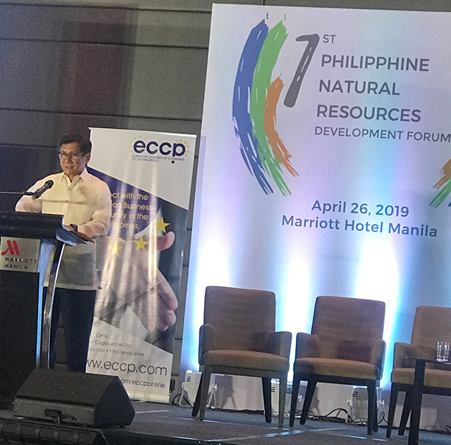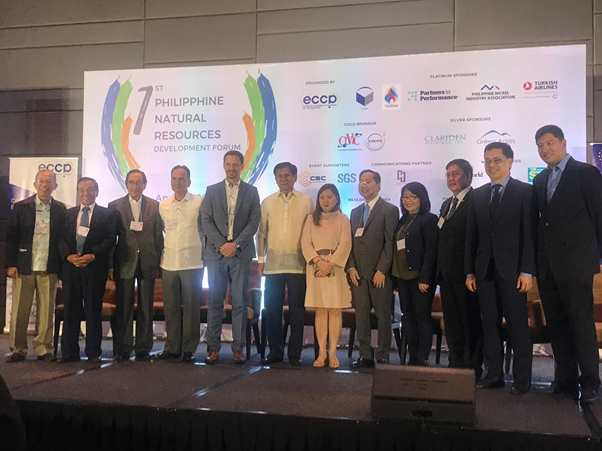The European Chamber of Commerce of the Philippines (ECCP) organized the 1st Philippine Natural Resources Development Forum last April 26, 2019 at the Marriott Hotel Manila with the theme, “Harnessing Natural Resources for Inclusiveness and Sustainable Development”.
The forum was attended by stakeholders from the public and private sectors, as well as, representatives from civil society organizations and academic institutions, to discuss the current situation of mining in the Philippines, specifically about mining’s contributions on the economy, global standards on good governance, and actions undertaken in pursuing sustainable mineral extraction. Through the said discussion, ECCP also aimed to address existing issues and challenges in the mining sector by strengthening current mining policies in the Philippines.
The forum was divided into four sessions, with each session focusing on the following topics: (a) Contribution to National, Local and Community Development; (b) Global Standards in Enhancing Inclusion along the Value Chain; (c) Good Practices in Responsible Natural Resource Management and Inclusive Value Chain; and (d) Unlocking Future Growth Opportunities.
Atty. Wilfredo Moncano, Acting Director of the Mines and Geosciences Bureau (MGB), presented during the first session of the discussion, focusing on optimizing the contribution of the extractive industries. He also discussed the current status of the mineral industry in the Philippines, including the approved mining tenements, the sector’s economic contribution, and current and proposed fiscal regime.
Secretary Roy A. Cimatu of the Department of Environmental and Natural Resources (DENR), on his keynote speech, said that in order to manage our mineral resources, we need to remember the five (5) following aspects: (a) social; (b) environmental; (c) technological; (d) industrialization; and (e) exploration aspect.
He started with the discussion on social acceptability, saying that it is an important aspect in the mining industry, especially with the presence of host communities. In order to regain and strengthen public trust, Secretary Cimatu suggested that social acceptability “should not just be treated in legal or regulatory sense.”
He also highlighted one issue in the environmental aspect that needs more attention – waste production, since mineral extraction is deemed to be the largest global waste producer. He also expressed his discontent on the weak enforcement of environmental laws and mitigating measures, and asked the mining sector to also do their part, and “strictly comply with environmental laws and standards.”
Furthermore, he also recommended to upgrade the mining industry’s monitoring system, standards and practices to better address environmental problems. He said that “we should ensure availability of mineral resources for the future generation”, and thus, we have to pursue sustainable exploration and extraction, including, but not limited to, shifting to renewable energy and improving governance in the mining sector.
Secretary Cimatu stated the success story of Boracay, saying that it was a challenge that seemed to be impossible, but the DENR tried and succeeded. He said that the DENR is willing to work with the mining sector to do the same and address issues in the mining industry.
Representatives from National Economic and Development Authority, Department of Energy, and other government agencies, as well as, private companies and civil society organizations, presented on various relevant topics, as well. Each presenter gave updates on their contributions and future actions to enhance the benefits that the mining sector could bring to the growth of economy, protection of the environment, and respect of public’s interests. Representatives from Quisumbing Torres, served as moderators during the series of discussion.

DENR Secretary Roy A. Cimatu, as he delivers his speech.
DENR Secretary Roy A. Cimatu (6th person from the left) and MGB Acting Director Atty. Wilfredo G. Moncano (3rdfrom the right) with other participants during the forum.
By: Mineral Economics, Information and Publication Division
